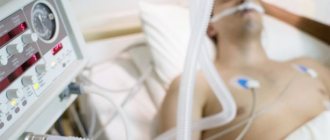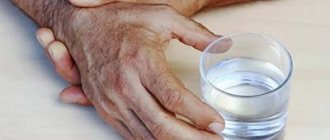Home>Articles>Alcoholic depression: symptoms and treatment
quick menu (hide)
- How does alcohol depression begin?
- Symptoms and varieties
- Mild course
- Depression after binge drinking
- Treatment
- Prevention of alcoholic depression
Alcohol abuse rarely goes away without leaving a trace. Any organs and systems can suffer from a bad habit. And among other things, alcohol leaves its mark on the psyche. Alcoholic depression often accompanies an addicted person. This condition requires special attention . How to get out of alcoholic depression, and how to understand that an alcohol addict is on the verge of this disorder?
Many people consider alcoholic drinks as a kind of antidepressant. After all, they allow you to relax and forget about problems. But don't be fooled. Any specialist will tell you that alcohol is not an antidepressant, it has the opposite effect. And it doesn't solve any problems. On the contrary, it often becomes the cause of severe depression, most often of the bipolar type. In practice there are indeed very often cases when a person seeks salvation from negativity at the bottom of the bottle, and then does not know how to get rid of alcoholic depression.
How does alcohol depression begin?
Considering such a broad topic as alcoholic depression, symptoms and treatment, it is necessary to study the algorithm for the formation of this condition. Thus, human emotions are formed by neurotransmitters. Their task is to transmit nerve impulses. Ethyl alcohol causes a decrease in con-serotonin, and this leads to worsening mood and gradual mental changes, including depression .
Alcohol consumption also leads to excessive production of norepinephrine, which is called the “rage hormone.” Therefore, excessive activity and energy surge arise. But as soon as alcohol intake stops, levels of this substance in the body drop. This leads to apathy and lethargy, which can also stimulate the onset of depression. Alcohol is processed by the body quickly enough, but toxic compounds remain in the body for a long time, continuing their effect.
Any alcoholic beverage can cause depression, any doctor will tell you this. Alcohol gives a short period of euphoria, and then for a long time provokes the opposite effect. Practice shows that alcoholism goes hand in hand with depression, anxiety, and manic disorders. Moreover, the longer the experience of alcoholism, the greater the likelihood of depression and other related disorders .
Statistics show that alcoholic depression occurs more often after the age of 35, among experienced alcoholics. It can take severe forms and be accompanied by suicidal thoughts and actions.
Physiological reasons
Poisoning with alcohol products provokes a number of negative consequences in the body.
1. Insufficient production of serotonin. A decrease in its concentration negatively affects mood and provokes fear, anxiety, and panic.
2. Hyperactivity of the nervous system. Overexcitation leads to sleep disturbances, tremors , irritation, followed by loss of strength and emotional exhaustion.
3. Changes in blood glucose levels. Alcohol abuse causes a spike in blood sugar, which can lead to confusion, disorientation, lack of coordination and, as a result, panic and a feeling of fear.
4. Dehydration. It is aggravated by diarrhea and vomiting from a hangover. The brain reacts especially acutely to dehydration. Due to insufficient nutrition of the organ cells, dizziness, weakness, anxious thoughts and attacks of fear occur.
5. Arrhythmia. Changes in heart rate and blood pressure cause anxiety, which can develop into panic.
6. Intoxication of the nervous system. This condition leads to the fact that the patient begins to beat himself up, is afraid to be alone and behaves aggressively.
Alcohol depression, symptoms and types
When it comes to a disorder like alcoholic depression, the symptoms can be very characteristic. So, among the most noticeable and frequent manifestations:
- Socially unacceptable and dangerous behavior;
- Increased injury rate;
- Suicidal thoughts and actions;
- Development of encephalopathy;
- Personality degradation;
- Epileptic psychosis as a consequence.
In practice, post-alcohol depression can occur in two ways. There are cases of short-term course after one-time cases of excessive drinking. There may also be a severe disorder , which usually occurs after heavy drinking.
In the first case, everything goes away on its own, and quite quickly. The second case is characterized by long-term disorders with severe manifestations. The person may need medical help.
Health implications
Despite the fact that depression goes away over time, people at risk may develop the following negative consequences:
- Auto-aggression. A condition in which a person tries to harm himself: scratch, cut, burn himself.
- Suicide. Suicide attempts often occur due to alcoholic depression.
It is important to understand that such manifestations are not typical for healthy people, but for those who have a history of some kind of mental disorder. But in other cases, primary depression can serve as an impetus for the progression of the disease and the development of alcohol dependence.
Mild alcoholic depression, symptoms and treatment
After drinking too much, depression occurs along with withdrawal symptoms. There are physiological signs of a hangover , and emotional depression and bad mood are also felt. A person may load himself with guilt due to an episode of drunkenness, experience remorse, and remorse. Nervousness can occur against the background of potassium deficiency and other physiological processes characteristic of the body after alcohol stress.
These short-term disorders are characterized by a persistent genetic dependence . There are people who never encounter such manifestations in their lives. For others, on the contrary, the problem occurs frequently. This is due to alcohol hydrogenase and its production by the body.
Usually in such situations the question of how to cope with alcoholic depression does not arise urgently. It goes away on its own; for some, it goes away within a few hours. Sometimes the problem lasts for several days , but still goes away on its own over time.
General hangover symptoms
When alcohol breaks down in the body, acetaldehyde is formed. A hangover syndrome is poisoning by the breakdown products of alcohol. With excessive alcohol consumption, the main burden falls on the liver. The organ cannot quickly cope with toxins, and they accumulate in the body.
Not only internal organs are affected, but also the nervous system. The psyche and some parts of the brain also suffer. The most striking are the physiological symptoms of a hangover. They appear:
- frequent urge to urinate;
- febrile state (chills give way to fever);
- severe nausea and vomiting;
- intense sweating;
- numbness of the upper and lower extremities, convulsions;
- drowsiness and lethargy during the day and insomnia at night;
- migraine, dizziness, loss of consciousness.
From the cardiovascular system, tachycardia, surges in blood pressure, and chest pain are observed. Alcohol poisoning also affects a person’s mental state. Most often, deviations from the norm manifest themselves as follows: hallucinations appear, a person is overcome by unreasonable fears, panic attacks, and thoughts of suicide arise. It is also very difficult for the patient to concentrate on something; he is tormented by vague anxiety and guilt, and an obsession with persecution appears.
Depression after binge drinking
The second case is more serious. There may be a complex disorder that requires complex treatment and the help of specialists. After long binges, this state occurs 2-5 days after the cessation of drinking, and marks the beginning of withdrawal syndrome . This begins to appear at stages 2-3 of alcoholism.
The deterioration of the mental state occurs simultaneously with physiological symptoms. Tremors, convulsions, and other symptoms characteristic of withdrawal occur. Alcoholic depression is growing, the treatment of which will be required. It can be expressed by strong negative experiences , crisis and lack of purpose in life, lack of understanding of one’s own importance. This type of depression forces a person to see the world in dark colors, to feel complete powerlessness and despair. All this answers the question of why alcoholics may commit suicide during abstinence.
Depression of this kind should not be looked upon with disdain. They pose a hidden threat to humans. And it’s not just a matter of suicidal risk, although this cannot be ignored . So, after a binge, a person can look quite well and return to work and normal everyday life. However, inside he will be filled with negativity, will see the world in dark colors and will look for a substitute for alcohol that will bring colors back to life. Of course, the new way of experiencing joy may be even more detrimental. Gambling, drugs, promiscuous sex life, and dangerous behavior can be chosen as a substitute. Some people tend to “go to work” at such moments and get chronic fatigue syndrome. the help of competent specialists can eliminate such consequences .
The mechanism of panic attacks
Many people wonder why panic attacks occur after drinking alcohol? This is due to the final effect of the components of alcohol. A hangover is a powerful stressor for the body. As a result, adrenaline is released . This is a hormone produced by the adrenal glands. With its excess, tachycardia, hypertension begins, breathing quickens and an inexplicable feeling of fear appears.
As the concentration of adrenaline increases, the oxygen content in the blood also increases. Blood vessels constrict, which only increases panic. The person feels empty and lost. Sometimes aggression appears. Symptoms get progressively worse. The duration of attacks varies: from 15-20 minutes to 1-1.5 hours. The danger is that they are repeated many times. At such moments, a person urgently needs help.
Alcohol depression - symptoms
Post-alcohol depression can vary in duration. Episodes stretch over a period from a day to a year, everything is very individual. The condition is fraught with relapses , often approaching manic-depressive psychosis. Symptoms associated with substance use disorders include:
- Insomnia or drowsiness.
- Cognitive problems.
- Decreased social activity
- Mood swings.
- General lethargy, which can be replaced by pathological activity.
- Gastrointestinal problems.
- Decreased appetite or gluttony.
- Increased causeless anxiety.
- Feeling of worthlessness.
- Attempts to escape from reality, even to the point of suicide.
- Unreasonable attacks of irritation and anger.
- The choice in favor of isolation from society, a secluded lifestyle.
- Lack of interest in everything.
- Lack of sexual interest and activity.
- Inability to do usual activities and work.
Alcohol depression, treatment
Speaking about the problems of treating these conditions, it is worth noting the most difficult moment. For the most part, people susceptible to alcoholism do not consider their depression to be related to alcoholism. Meanwhile, it is the toxic effects of alcohol that give rise to depression, especially in the case of sudden withdrawal from binge drinking. Therefore, it is worth noting that the treatment of depression of this kind should begin with the treatment of alcoholism as the root cause of their occurrence.
Full awareness of the problem significantly helps in combating it. Understanding that after giving up alcohol, depression will begin along with withdrawal, a person will be ready for it and will be able to overcome it. Also, if necessary, you can seek help from psychologists and psychiatrists at rehabilitation centers and assistance centers. Existing social adaptation programs are excellent at helping to cope with such problems.
Mild forms of post-alcohol disorders usually go away on their own, and the help of doctors is rarely required. If we talk about problems of moderate severity, a little help may be needed here, and in the vast majority of cases it ensures success. However, severe disorder following binge drinking requires professional management, since it is a complex and responsible process. Modern experts point out the advisability of an individual approach, choosing complex treatment. It includes psychotherapy, procedures and medications.
Prevention of alcoholic depression
Quitting alcohol completely gives a person many benefits. This measure allows you to improve your life, succeed in your career, and find family happiness . To eliminate alcoholic depression, you need to eliminate alcohol itself from your life. If you have a persistent addiction, it is better to turn to specialists, because a rehabilitation center or clinic will definitely help you in the best possible way. Those who decide to deal with the problem on their own should be given practical advice.
So, whenever possible, you should avoid the company of people who drink and events where there will be drinking. If this is not possible and you have to attend a party or communicate with people who drink, you need to come up with a compelling “legend” about why you should not drink. For example, you can say that you are taking medications that do not combine with alcohol. Perhaps considering heredity will help motivate yourself to give up alcohol. If among your relatives there were alcoholics or people with mental disorders, you should absolutely not associate your life with alcohol.
With a general tendency towards depression, it is worth communicating with positive people, and not yet succumb to apathy in the spring and autumn.
Bright lighting, vitamins and pleasant little things will drive away the blues. You should also definitely acquire an interesting hobby that will not let you get bored and idle. Then a bad mood will definitely not threaten you.
Types of connections between alcohol and panic attacks
Panic attacks caused by alcohol are divided into two types. In both cases the symptoms are similar. The difference is some nuances of alcohol consumption.
Blocking "to"
This means before taking a new dose of alcohol. The condition is typical for binge alcoholics. A syndrome similar to agorophobia develops. This mental disorder is manifested by fear of crowds and crowded places. A person cannot calmly walk to a store and buy an alcoholic drink.
At a normal walking pace, the heart rate increases, dizziness, increased sweating and muscle weakness appear. This condition is fraught with loss of consciousness. The attack is repeated several times. As a result, the alcoholic gives up trying to buy alcohol. After some time, the symptoms disappear and overall health improves. The danger of the syndrome is that real agoraphobia can develop.
Blocking "after"
A panic attack occurs during a hangover. The attacks are recorded throughout the hangover period. They are accompanied by the same symptoms as with blocking “before”. It is necessary to completely give up alcohol and cleanse the body of toxins.








